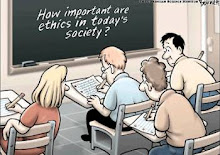Circumstance A: Fred overslept this morning and is very late to work. He gets in his car and decides to drive 30 mph over the speed limit to try to get to an important 9:00 am meeting on time. Just as he's rounding a particular turn on a road, a police officer sees Fred speeding, pulls him over and gives him a ticket.Initially I think most peoples' response is YES! Bob killed a child, Fred just drove too fast. Throw Bob to the wolves! But before we let Fred off the hook, consider this:
Circumstance B: Bob also overslept this morning and is very late to work. He gets in his car and decides to drive 30 mph over the speed limit to try to get to an important 9:00 am meeting on time. Just has he's round a particular turn on a road, a small child darts in front of his path, and Bob's car strikes and kills that child. The police come and Bob is charge with involuntary manslaughter.
Question: Are we justified in treating Fred and Bob differently?
Fred and Bob did exactly the same actions for exactly the same reasons. They drove down the same road at the same speed at the same time under the same conditions. Neither Bob nor Fred had any control over whether or not a child would run onto the road, and so there's a real sense in which it was just a matter of luck that Bob hit a child and Fred got off light with a speeding ticket. Since neither person had any control over whether or not their actions caused someone's death, shouldn't their equal level of recklessness be treated equally?



1 comment:
Fred and Bob are not being treated differently. Fred got caught speeding so he got a ticket. If Fred had also hit a child, he would have also been charged with involuntary manslaughter just like Bob. The same rules apply to both men; if you speed and get caught, you get a ticket, and if you speed and hit kill a child you get involuntary manslaughter. Both men are treated equally insofar as they would have both been charged with equal crimes had they caused equal consequences.
Post a Comment